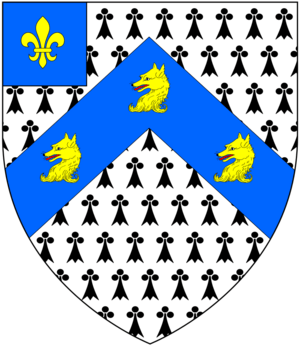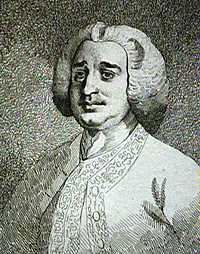Henry Fox, 1st Baron Holland facts for kids
Quick facts for kids
The Lord Holland
|
|
|---|---|
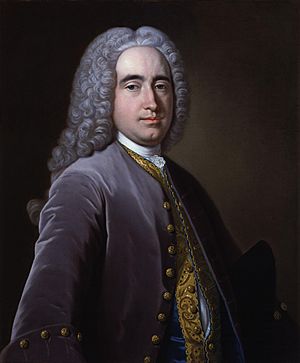 |
|
| Leader of the House of Commons | |
| In office 26 May 1762 – 16 April 1763 |
|
| Monarch | George III |
| Prime Minister | The Earl of Bute |
| Preceded by | George Grenville |
| Succeeded by | George Grenville |
| In office 14 November 1755 – 13 November 1756 |
|
| Monarch | George II |
| Prime Minister | The Duke of Newcastle |
| Preceded by | Thomas Robinson |
| Succeeded by | William Pitt |
| Paymaster of the Forces | |
| In office 2 July 1757 – 13 July 1765 |
|
| Monarch | George II George III |
| Prime Minister | The Duke of Newcastle The Earl of Bute George Grenville |
| Preceded by | Viscount Dupplin Thomas Potter |
| Succeeded by | Charles Townshend |
| Secretary of State for the Southern Department | |
| In office 14 November 1755 – 13 November 1756 |
|
| Monarch | George II |
| Prime Minister | The Duke of Newcastle |
| Preceded by | Thomas Robinson |
| Succeeded by | William Pitt |
| Secretary at War | |
| In office 1746–1755 |
|
| Monarch | George II |
| Prime Minister | Henry Pelham The Duke of Newcastle |
| Preceded by | Thomas Winnington |
| Succeeded by | The Viscount Barrington |
| Personal details | |
| Born | 28 September 1705 |
| Died | 1 July 1774 (aged 68) Holland House, Kensington, Middlesex, England |
| Political party | Whig |
| Spouse | |
| Children |
|
| Parents |
|
| Education | Eton College |
| Profession | Politician |
Henry Fox, 1st Baron Holland (born September 28, 1705 – died July 1, 1774) was an important English politician. He was a member of the Whig party. He held several key government jobs, including Secretary at War from 1746 to 1755. He was also Secretary of State for the Southern Department and Paymaster of the Forces. While he was Paymaster, he became very rich. Many people thought he might become Prime Minister, but he never did. His third son, Charles James Fox, also became a famous Whig politician.
Early Life and Family
Henry Fox was the second son of Sir Stephen Fox. His mother was Christiana Hope. He inherited a lot of money from his father. However, he spent most of it quickly. To avoid people he owed money to, he traveled to Europe. There, he met a wealthy woman who helped him financially. This allowed him to return home after several years.
Marriage and Children
In 1744, Henry Fox married Lady Caroline Lennox. She was much younger than him. Lady Caroline was the daughter of Charles Lennox, 2nd Duke of Richmond. Her grandfather was King Charles II. Their marriage caused a big stir in high society because they eloped. Lady Caroline later became Baroness Holland.
Henry and Caroline had several children:
- Stephen Fox, 2nd Baron Holland (1745–1774): He was the oldest son. He inherited his father's estate in Wiltshire and a lot of money.
- Henry Charles Fox (1746–1746): He died as a baby.
- Charles James Fox (1749–1806): He was the third son and became a very famous Whig politician. He was known for being a gambler, like his older brother. His father left him estates in Kent and cash.
- General Henry Edward Fox (1755–1811): He was the youngest son. He also inherited an estate and money.
Henry Fox was known for spoiling his children. He let them meet many important people who visited their home. His son, Charles, grew up to be a politician just as famous as his father.
Political Career
Becoming a Member of Parliament
In 1735, Henry Fox became a Member of Parliament for Hindon. He became a strong supporter of Sir Robert Walpole, who was the Prime Minister for a long time. Fox was very good at the political games of the time. He gave a notable speech in Parliament, urging Britain to support its allies in Europe, especially Austria.
He usually sided with the government's Whig party. He was a skilled speaker and could even debate against William Pitt. This helped him become an important part of several governments. He served as Surveyor-General of Works from 1737 to 1742. He was also a Member of Parliament for Windsor from 1741 to 1761. In 1743, he became a Lord of the Treasury.
Serving as Secretary at War
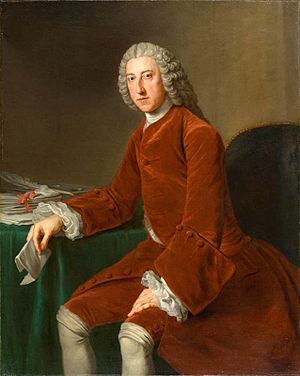
In 1746, Fox was made Secretary at War and a member of the Privy Council. This was during the War of the Austrian Succession. At this time, much of Britain's foreign policy was controlled by the Duke of Newcastle. Fox often acted as his helper and defended the government's military plans in Parliament.
During these years, Fox became a close friend of Prince William, Duke of Cumberland. The Duke was the King's youngest son and a military commander. He was famous for stopping the Jacobite rebellion of 1745. He also had many political followers in London. This friendship helped Fox communicate with King George II of Great Britain. Fox soon became a favorite of King George II.
By the early 1750s, both Fox and Pitt were seen as future leaders. This made their rivalry even stronger. Fox was closer to the top job because of his role as War Secretary. In 1754, the Prime Minister, Henry Pelham, suddenly died. This brought the rivalry between Fox and Pitt to a head. Pelham's brother, the Duke of Newcastle, became the new Prime Minister. He needed a strong person to represent him in the House of Commons. This job was very important. Pitt and Fox were the top choices.
Newcastle was worried about both men's strong ambitions. He chose Sir Thomas Robinson instead. Newcastle had offered the job to Fox first, but with conditions Fox would not accept. This allowed Newcastle to give the job to Robinson.
Robinson was not very good at the job. He struggled to defend the government from attacks by Fox and Pitt, who were both angry. At this time, Britain faced a serious situation in America. Newcastle began to think about working with either Pitt or Fox. He chose Fox, believing Pitt would be harder to control.
Working with the Duke of Newcastle
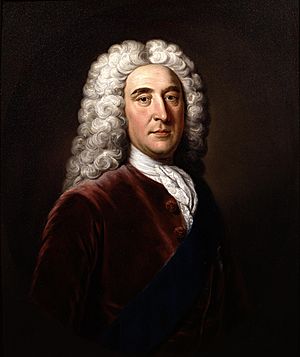
In 1755, Newcastle agreed to work with Fox. Fox was given two important jobs: Leader of the House of Commons and Southern Secretary. Their alliance was seen as the only way to stop a government that might include Pitt, who was an enemy to both of them. Newcastle did not like Fox much, thinking he was too greedy. Fox was strongly influenced by Cumberland, who wanted a strong response to a dispute with the French in the Ohio Country. Fox and Cumberland pushed this policy on a hesitant Newcastle.
They decided to send a large British army under Edward Braddock to America. Their goal was to remove the French from the Ohio Territory. Braddock's army suffered a terrible defeat in July 1755. When this news reached London, Newcastle and Fox faced more pressure. Pitt criticized how the crisis was handled. He said Britain was not ready for a major war with France.
War with France broke out the next year. It was over France's invasion of Prussia, not the American situation. Fox and Newcastle knew that Menorca was in danger from a French attack. They sent a naval force to help the island.
However, the fleet could not stop the Fall of Menorca. This caused a huge public outcry against the commander, Admiral Sir John Byng, and the government. Fox and Newcastle started a legal case against Byng. Byng was later executed after a court martial for "failing to do his utmost." Many people thought this was done to protect Newcastle and Fox from blame. On October 13, 1756, Fox resigned. This weakened Newcastle, and his government fell in November.
Pitt then formed a new government. But Pitt had little control over most Members of Parliament. His government collapsed in April 1757. The King wanted Newcastle and Fox to return to power. But Newcastle now strongly disliked Fox because of the Byng affair. He refused to work with him. For three months, Britain's war effort had no clear leader. Fox hoped to become Prime Minister with Cumberland's support. But he could not agree with Pitt or Newcastle. In mid-summer, Pitt and Newcastle surprised everyone and formed a partnership. Fox was left out. He then decided to seek a profitable job instead.
Becoming Paymaster General of the Forces
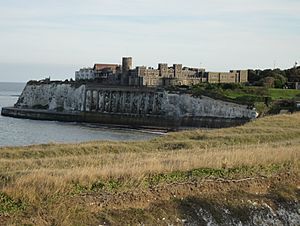
In 1757, Fox was given the job of Paymaster of the Forces. This job had existed since 1662. Henry Fox's father, Sir Stephen Fox, was the first to hold it. Over time, this job became very important and could be very profitable.
During the war, Fox focused on making a lot of money. The British Army grew a lot during these years. This gave him more chances to make money from his position. He worked with Nicholas Magens and George Amyand. Some people estimated he made £400,000 in his eight years in the job. This was about £50,000 a year. Around 1760, he built the original Kingsgate Castle in Kent.
In 1762, he again became the Leader of the House of Commons. He also joined the Cabinet under Lord Bute. He helped the House of Commons approve the Treaty of Paris. As a reward, he was given the title Baron Holland on April 16, 1763. This meant he became a member of the House of Lords.
Resignation
In 1765, Fox had to resign from the Paymaster Generalship. Four years later, a group from the City of London criticized him. They called him "the public defaulter of unaccounted millions." This meant they believed he had kept millions of public money that he should have accounted for.
This was not the first time he was criticized for how he handled money in his office. In 1763, similar issues were raised in Parliament. But in 1769, the criticism became much stronger and spread outside Parliament. The city's statement said that over forty million pounds of public money were not accounted for in the army Pay Office. They also said that legal action had been started but then stopped by the King.
The legal cases against him were delayed by a special order from the King. Fox showed that he had not broken the law by delaying the accounts. However, he had made a large fortune from the interest on the money that was not accounted for.
Later Life
Henry Fox tried hard to become an Earl, a higher title, but he failed. He died at Holland House in Kensington on July 1, 1774. He was a very disappointed man. He had a reputation for being cunning and dishonest. He was one of the most unpopular politicians of his time.
Legacy
When Henry Fox first entered politics, many thought he was the greatest politician of his time. They saw him as a future Prime Minister who could bring new ideas to the Whig party. However, in 1755, he disappointed them by working with Newcastle. Then, in 1757, he took the Paymaster General job. This job was very profitable but not very important politically. This made many people think he was no longer a serious candidate for top government roles. Rumors that he had taken £400,000 during his eight years in the job also hurt his reputation. Most stories about him show him as vain and greedy.
His son, Charles James Fox, also became a leading figure in the Whig party. Many people thought he too would become a national leader. However, Charles Fox faced similar challenges to his father. He was also prevented from becoming Prime Minister by William Pitt the Younger, the younger son of his father's rival. William Pitt the Younger held the office for twenty years, leaving Charles Fox out of power, much like his father had been.
In the 1999 British TV series Aristocrats, which showed the lives of the wealthy Lennox family, Henry Fox was played by Alun Armstrong.
 | Shirley Ann Jackson |
 | Garett Morgan |
 | J. Ernest Wilkins Jr. |
 | Elijah McCoy |


